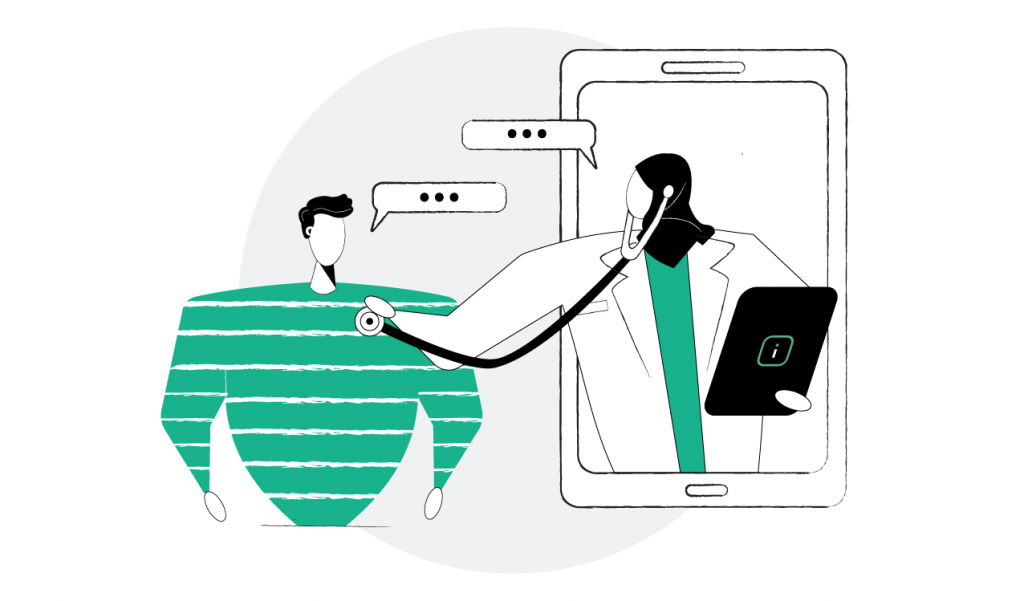The readiness and affordances of telehealth have been an asset during the current global pandemic. Various apps are emerging that allow you to choose the preferred specialist, doctor, and appointment time from your phone screen. As a family that has been without a doctor for almost two years, it is a sigh of relief that we can build a relationship with a doctor and have a video conference when we consider whether healthcare has traditionally been equitable and accessible. With the persistent shortage and reach of doctors in Canada, I argue that the intersectionality of mobile technology and healthcare is a welcome innovation.
https://www.iversoft.ca/mobile-technology-in-the-medical-industry/https://blogs.ubc.ca/etec523/files/2021/09/Medical-and-Mobile-How-Telemedicine-Is-Transforming-The-Health-Care-Industry-1.png

Telehealth and Mobile Technology have developed very strong bonds over the last 19 months of the Covid Pandemic. It is indeed a lifesaver in many respects and certainly, from a Northern perspective allowed for a safer control of client flow between Nunavik and the south, which consequently remained relatively Covid -free.(plus use of a rigourous Covid alogorithm as additional benchmarkers )
From another perspective two aspects impact medical practice/ diagnostics.
1. Limited quality technology available ( especially in the Arctic regions)
2. Need for clinical ie hands-on and the increase in psychological / psychiatric interventions face to face.
3 Culturally for many indigeneous populations, trust and safety factors can only be constructed through physical presence.
4. Additionally, mobile technology is not always adapted linguistically to all groups, both in design and again in language of communication.
Grace, I think you raise a very valid point. Technology, mobile-friendly telehealth in particular, is an asset when attempting to bridge the gap in areas and instances of healthcare inequality. I live in a rural setting 1-hour from the closest hospital (the only emergency/urgent care option in the region) and 4+ hours from most specialists. Opening up access to telehealth appointments meant my father could meet with his cardiologist who is located Downtown Toronto without having to make the 8+ hour round trip.
I wonder if there is any research being done on the effects of telehealth on holistic patient care (for example has the ability to speak to specialists through technology reduced stress by removing barriers such as travel, commuting, incurred costs, etc..)?
While pondering on telehealth research I did come across this discussion paper on Virtual Care in Canada that may be of interest:
https://www.cma.ca/sites/default/files/pdf/News/Virtual_Care_discussionpaper_v2EN.pdf
Thanks for posting the article. I’m now wondering how the flow how Telehealth could be used to streamline patient care. If the flow of care started with an online appointment and in person was reserved for cases that required physical presence, perhaps that would free up family practitioners to serve a wider population. Similar to the triage approach one has when they go to emergency. It’s exciting to consider how this is going impact the future of healthcare.
I agree with Asha, that Telehealth cannot fully replace in-person healthcare. I have a background working in operations and managing employees and schedules. I noticed that ever since Telehealth has become more popular during the pandemic, the workflow of the workplace is more efficient. Before the pandemic, if I wanted to see a doctor, I have to book at least 2-3 hours off. With people working form home and having Telehealth, they only need to block off a maximum of 1 and half hours. Depending on the type of operations, this causes less disruptions to the schedule or production schedules.
I agree with you that intersectionality of mobile technology and healthcare is a welcome innovation but I know that many in the health care field are skeptical about it’s benefits. From my own personal experience, we were grateful throughout the lockdowns in Ontario to be able to access health care through mobile technology and used it several times to access video consults with doctors for my children. I was very impressed that I was able to book a video consult for my son while he was in Quebec and I was in Ontario after he injured his shoulder and had neither parent with him, I was able to book the appointment online, he attended the video consult with the physician alone in Quebec at a cottage and then we were able to immediately access his medical information online including the doctors notes/recommendations so that we didn’t have to rely on the second hand information from our 15 year old. I don’t believe that it can ever replace in person healthcare but in times of crisis or when you aren’t able to be with your child and they require care, it was a valuable tool that I was grateful to be able to use and I do think it will become more and more common now that we have begun to use it.